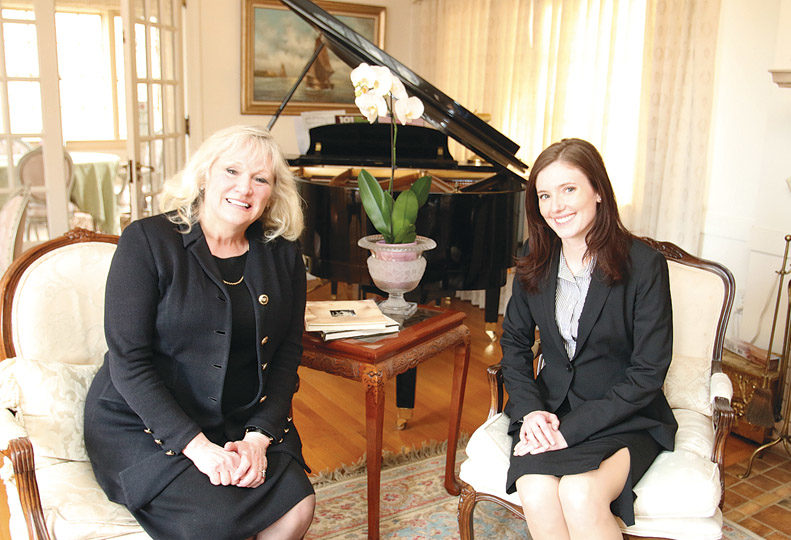
Home » Small firm reduces legal conflict through mediation
Small firm reduces legal conflict through mediation
Alternative resolution said to save clients time, money

March 26, 2015
Luna Legal LLC, a two-attorney firm that opened late last year on the South Hill, focuses on mediation to help clients resolve disputes without the stress and expense of litigation.
Mari Luna, who has extensive experience in nonprofit and volunteer legal work, and Stephanie Zimmerman, who graduated from law school two years ago, started the practice as partners after working together on a few cases with nonprofit Fulcrum Institute Dispute Resolution Clinic, of Spokane.
Luna, who has mediated more than 1,100 cases ranging from family law to real estate foreclosures, says Zimmerman was able to put mediation skills into practice much earlier than most attorneys she’s seen in alternative dispute resolution clinics at Fulcrum.
In mediation, parties to a lawsuit meet with a neutral third party, who helps guide negotiations toward a resolution of the case.
Zimmerman says Luna helped her see how mediation could get opposing parties to consider new ideas.
“I saw her mediating, and we realized we work well together,” she says.
Luna says Zimmerman is the most organized of the two, while Zimmerman counters that Luna always sees the bigger picture.
Luna earned her law degree at Seattle University School of Law in 1985. She worked the last six years for Fulcrum.
She’s involved in the Spokane County Court Appointed Special Advocate program, and she’s also an experienced guardian ad litem, which is a court-appointed representative of a child or incapacitated party involved in legal proceedings.
Luna also is a regular volunteer providing legal services for the Center for Justice, of Spokane.
Zimmerman earned her law degree at Gonzaga University School of Law in 2013.
The Wenatchee native was part of the state’s Running Start program, which enables students to take up to two years of college-level courses while still in high school, meaning such students potentially can earn a four-year college degree two years out of high school.
“At Gonzaga, I wasn’t ready to leave after two years, so I went to law school,” she says.
She began to develop an interest in alternative dispute resolution at law school, and afterward sought further training at Fulcrum.
Her nonprofit work includes providing legal services through Refuge Connections Spokane, a humanitarian organization that promotes refugee resettlement and success.
Luna Law is based in a historic Tudor-style mansion at 716 E. Rockwood Blvd., on the South Hill. The practice occupies up to 1,500 square feet of the 7,200-square-foot Luna-Priess house, including several meeting rooms on the first floor and the firm’s private offices on the second floor.
Because the law office also is a historic home, participants in mediation tend to be more at ease there than in a typical conference room, Zimmerman says.
“We often hold end conferences at the dining room table,” she says. “People seem to like it here.”
Luna Legal has no other staff, although Luna says the practice plans to create an internship position for paralegal training.
Luna says most legal disputes can be settled through mediation rather than litigation.
Civil litigation can result in a court-ordered compromise that leaves no one happy, she says, while mediation ideally helps frame a negotiated settlement from the outset.
Mediation can be especially effective in family law, in which children’s well-being could be at stake.
“Holding onto animosity isn’t going to be good for kids,” Luna says, of divorce litigation. “The judge doesn’t want to make the decision of where the kids belong.”
Zimmerman adds that litigation is more time consuming and expensive than mediated settlements.
She says mediation can identify early on what issues are and aren’t in contention, cutting down on the time needed to resolve a case.
By state law, a divorce takes a minimum of 90 days to complete, and that’s only if the parties agree to everything, Luna says. “For those who choose to litigate, it would probably take a year for the case to go through the court calendar,” she says.
Until the mediated agreement is signed by all parties and filed in court, litigation remains an option, she says.
Parties also can mediate some issues and litigate those they can’t agree upon.
Luna says she’s been involved in mediation that’s helped mortgage lenders and borrowers stave off foreclosure actions.
The Foreclosure Mediation Act of 2010 enables borrowers to request mediation through the U.S. Department of Housing and Urban Development or an attorney, she says.
The act is intended to ensure a consistent communication pipeline between the borrower and lender.
“The act holds the bank to giving the borrower a single point of contact,” Luna says.
Zimmerman says Luna Legal offers potential clients a half hour of free consultation.
“In the first half hour we want to identify what the issue is,” she says.
After analyzing the issue, the attorney advises the client whether the firm can help them or recommends other services.
Due in part to their nonprofit work, the partners are in contact with a lot of people who can’t afford a private attorney.
Luna says, “If they can’t hire us, we’ll recommend walawhelp.com, or the Family Law Center, downtown.”
She says the Family Law Center is a great resource, and the facilitator there can help review legal paperwork, but can’t offer legal advice.
The walawhelp.com website is an online clearinghouse for free legal services for low-income people and seniors.
Special Report
Related Articles




